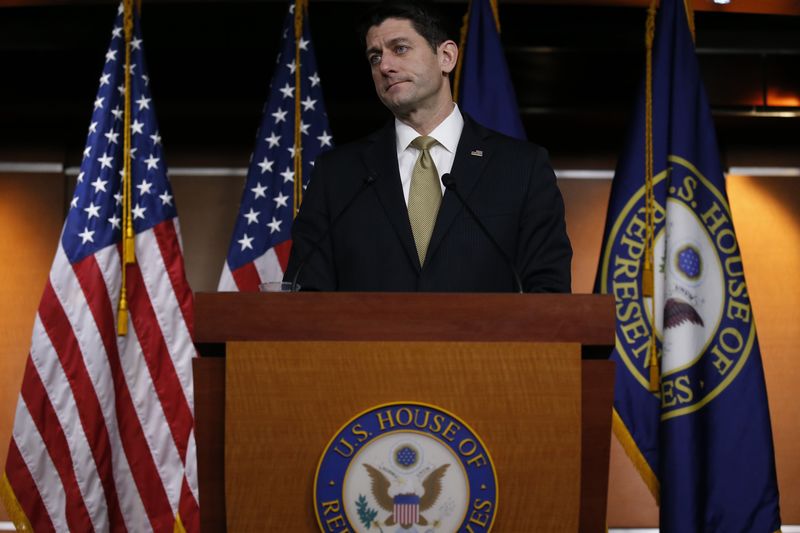 © Reuters. U.S. House Speaker Ryan holds his weekly press conference at the U.S. Capitol in Washington
© Reuters. U.S. House Speaker Ryan holds his weekly press conference at the U.S. Capitol in WashingtonBy Richard Cowan
WASHINGTON (Reuters) – Congressional Republicans plowed ahead on Thursday with efforts to reach agreement on a temporary extension of government funding to avert a politically embarrassing shutdown despite mixed signals from President Donald Trump on elements of the stopgap plan.
Trump complicated the negotiations by criticizing a plan to win Democratic support with a six-year extension of funding for the Children’s Health Insurance Program (CHIP), a Democratic priority. The White House later issued a statement saying the president fully supported the proposal pending in the House of Representatives.
“The president supports the continuing resolution introduced in the House,” White House spokesman Raj Shah said.
Questions about Trump’s support arose earlier on Thursday, when he said on Twitter that “CHIP should be part of a long term solution, not a 30 Day, or short term, extension!”
Leaders of the Republican-controlled Congress have been struggling for months to fund the government, which is now operating on its third temporary funding extension since the 2018 fiscal year began on Oct. 1.
A House vote on an extension to Feb. 16 is expected sometime after 2:30 p.m. EST (1930 GMT), House Republican Majority Leader Kevin McCarthy said, but it was unclear if there were enough votes to pass it in either the House or Senate, given opposition in both parties.
“We still don’t have the votes here in the House. We made good progress last night. Hopefully, we’ll get there today,” Republican Mark Meadows, head of the conservative House Freedom Caucus, told MSNBC on Thursday.
Some House conservatives want additional defense funding in the short-term measure. Meadows spoke with Trump on Wednesday night and said, “he does not want a shutdown. He made that very clear.”
But House Speaker Paul Ryan told reporters he was confident the bill would pass. “We’re in a good place,” he said.
Senate Republican Majority Leader Mitch McConnell said he anticipated the House would pass the temporary measure and the Senate would take it up after that.
“Shouldn’t be a difficult vote. There’s nothing, nothing in such a continuing resolution that my Democratic friends actually oppose,” he said.
Democrats, however, have insisted a long-term spending bill must include a measure covering “Dreamers,” illegal immigrants brought to the country as children who were protected from deportation under former President Barack Obama’s Deferred Action for Childhood Arrivals (DACA) program.
Trump ordered DACA to end in March and asked Congress to come up with a legislative fix. But bipartisan congressional negotiations with the White House faltered last week, prompting Republican leaders to begin pushing for the passage of the stopgap measure.
Senate Democratic Leader Chuck Schumer criticized Trump for taking a trip to Pennsylvania on Thursday to campaign for a Republican candidate for the U.S. House rather than staying for the negotiations. He said the House bill to fund the government is “very likely to be unacceptable to the Senate.”
Schumer said Trump’s changing positions on government spending and an immigration measure were impeding progress in Congress.
“The one thing standing in our way is the unrelenting flow of chaos on the other end of Pennsylvania Avenue (the White House). It has reduced the Republicans to shambles. They don’t know who to negotiate with,” he said in a Senate floor speech.
Republicans hold a 51-49 majority in the Senate and most legislation, including spending bills or an immigration deal, will require 60 votes to pass.
Republican Senator Lindsey Graham, who is involved in the immigration negotiations, said he would not vote for a short-term funding bill. His conservative colleague Mike Rounds told CNN on Thursday he could not back the current measure.
Source: Investing.com





























